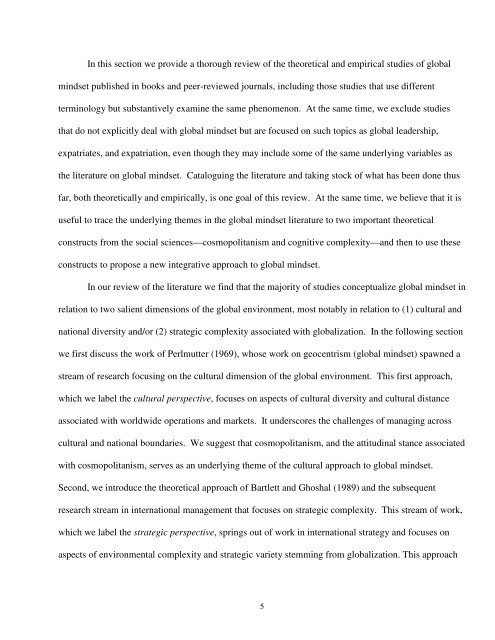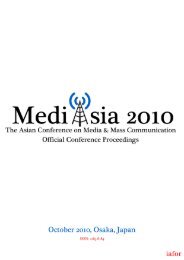What We Talk About When We Talk About “Global Mindset”
What We Talk About When We Talk About “Global Mindset”
What We Talk About When We Talk About “Global Mindset”
Create successful ePaper yourself
Turn your PDF publications into a flip-book with our unique Google optimized e-Paper software.
In this section we provide a thorough review of the theoretical and empirical studies of global<br />
mindset published in books and peer-reviewed journals, including those studies that use different<br />
terminology but substantively examine the same phenomenon. At the same time, we exclude studies<br />
that do not explicitly deal with global mindset but are focused on such topics as global leadership,<br />
expatriates, and expatriation, even though they may include some of the same underlying variables as<br />
the literature on global mindset. Cataloguing the literature and taking stock of what has been done thus<br />
far, both theoretically and empirically, is one goal of this review. At the same time, we believe that it is<br />
useful to trace the underlying themes in the global mindset literature to two important theoretical<br />
constructs from the social sciences—cosmopolitanism and cognitive complexity—and then to use these<br />
constructs to propose a new integrative approach to global mindset.<br />
In our review of the literature we find that the majority of studies conceptualize global mindset in<br />
relation to two salient dimensions of the global environment, most notably in relation to (1) cultural and<br />
national diversity and/or (2) strategic complexity associated with globalization. In the following section<br />
we first discuss the work of Perlmutter (1969), whose work on geocentrism (global mindset) spawned a<br />
stream of research focusing on the cultural dimension of the global environment. This first approach,<br />
which we label the cultural perspective, focuses on aspects of cultural diversity and cultural distance<br />
associated with worldwide operations and markets. It underscores the challenges of managing across<br />
cultural and national boundaries. <strong>We</strong> suggest that cosmopolitanism, and the attitudinal stance associated<br />
with cosmopolitanism, serves as an underlying theme of the cultural approach to global mindset.<br />
Second, we introduce the theoretical approach of Bartlett and Ghoshal (1989) and the subsequent<br />
research stream in international management that focuses on strategic complexity. This stream of work,<br />
which we label the strategic perspective, springs out of work in international strategy and focuses on<br />
aspects of environmental complexity and strategic variety stemming from globalization. This approach<br />
5









